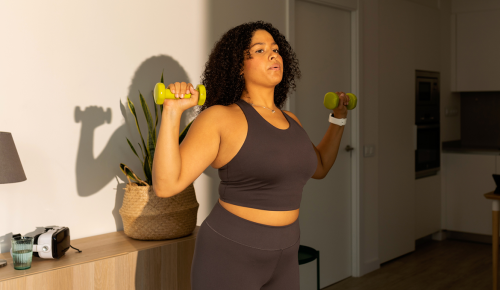Our editors independently select these products. Making a purchase through our links may earn Well+Good a commission
In 30 minutes, you can watch an episode of Broad City, cook up a kale pasta salad, or indulge in a facial. Turns out, that’s also the amount of time it takes to log an effective run.
Experts in This Article
science journalist and the author of Running Smart: How Science Can Improve Your Endurance and Performance
USATF and VDOT02-certified running coach and founder of Lift Run Perform
physical therapist, run coach, and certified strength and conditioning specialist
“There’s a huge benefit to the 30-minute run,” says Mary Johnson, a 3:06 marathoner, coach, and founder of Lift, Run, Perform. That’s right: If you’re wondering how long should you run, just half an hour can totally do the trick. “Running for 30 minutes gives you a considerable amount of benefits, including making your body more efficient, increasing blood flow to help with active recovery, and developing your heart and lungs. You get a lot of bang for your buck in 30 minutes.”
“So many runners ask me how many miles they should run. But it’s not about miles—it’s about minutes.” —Mary Johnson, running coach
But when it comes to the effectiveness of your workout, there’s really no “run size fits all” solution. Instead, determining how long your run should be comes down to your goals and what you’re hoping to gain from your time on the road, treadmill, track, or trails.
“So many runners ask me how many miles they should run,” says Johnson. “But it’s not about miles—it’s about minutes. There’s no set number of miles you should run every day. It’s about time on your feet, which is so much more important, whether you’re a beginner or an experienced runner training for a marathon.”
So, how do you figure out your magic number? Keep reading for recs for the optimal daily running mileage in various situations—whether you’re a newbie or a competitive racer.
Start slow and gradually increase distance
How many miles should a beginner run each day? Fewer than you probably think. Even if you’re a regular on the Pilates reformer or you cozy up to the barre more than you hit happy hour, running is a different beast—and it can beat up your body in a totally new way. So, Johnson says it’s crucial to start slowly to avoid injury. A good running distance for beginners is simply as long as your body can handle.
“If you have a difficult time running to the end of your driveway, that’s where you start,” Johnson says. “Start with what you can do, and then pick an achievable goal.” That might be a mile when you’re a beginner; it might be even less—any amount of running will help your body get more used to the movement and its impact.
To get comfortable spending more time on your feet, Johnson suggests employing a walk-run strategy. “Do three minutes of running followed by a minute of walking, and repeat that for 20 to 25 minutes,” she says.
Just make sure to get in a good warm-up before pounding the pavement. These stretches for runners are a great place to start (and finish). And adding these yoga poses for runners into your fitness routine is a good idea as well since they can help aid recovery.
Start here to get your body ready to run:
Just remember: The first mile tends to be the toughest to get through, whether you’re a beginner or veteran, so have a plan in place. A killer playlist can help you power through it in stride, and the right running essentials can make those first few steps (and all the ones that come after) far more comfortable.
To build endurance, up your mileage
Whether you’ve signed up for a half marathon or you just want to be able to hang with your friends for weekend runs, the key to increasing running endurance is to spend more time on your feet. “If you’re only running three times per week, consider adding a fourth day to your routine,” says Johnson. “Just be mindful about not overloading your system, and increase your mileage gradually.”
So if you’re running for 20 minutes three days per week, bump that up to 25 minutes three days a week, or add a fourth 20-minute run to your schedule. “This is a good way to add a bit more stress and time to your body, and to increase your endurance over time,” Johnson says.
Even if you’re an experienced runner, you want to be gradual and safely increase your daily running mileage so you don’t overtax your system. “For example, if I’m pretty comfortable running 50 to 53 miles per week, then I’ll want to start getting into 55 to 58 for three or so weeks before I cross into the 60-plus miles-per-week zone,” she says. “The adjustment period is crucial, and you’re much more likely to successfully adapt to bigger mileage if your body has progressively and consistently built into that mileage.”
And keep in mind: Unless you’re specifically trying to do a run streak of running every day (in which case you should keep mileage very minimal), you should be taking rest days at least once or twice a week. “At the end of the day, no matter what sport you play, no matter what activity you do, your body needs rest in order to improve. It’s just a scientific fact,” physical therapist and run coach Victoria Sekely, DPT, told The Well+Good Podcast about taking proper recovery.
In marathon training, quality matters more than distance
Just like every body is different, every marathon training plan is unique. The most important thing when you’re training for a 26.2-mile race, Johnson says, is cumulative fatigue, the idea that you’re incrementally more tired with every run you log and that the effect of all your physical exertion is carried with you over the course of your training.
While many popular training plans have runners peaking with a 20- or 22-mile long run, Johnson says that may not be necessary—and you could be better off adding easy miles throughout the week. “People are too risky and tend to run too long, in my opinion,” Johnson says. “I like to pad the week with easy miles around quality efforts, which are usually speed and longer runs.” Racking up endless miles makes it all too easy to lose good running form, potentially leading to injury.
If you’re going for your first marathon and aren’t concerned about your pace, Johnson says to try and keep your long run to no more than 30 percent of your weekly mileage. (So for many runners, that means peaking around 16 to 18 miles for a long run.) “Going above that can put you at greater risk for injury and, quite frankly, can make you feel like crap,” she says. “It’s important to stay safe so you can make it to that start line.”
Spend the extra time instead working on your running power and strength with drills, and strength and mobility training. You’ll get more bang for your buck.
Try this Pilates session specifically designed for runners:
To reap longevity benefits, aim for at least 20 miles a week
Doing any running at all can offer long-term health benefits, like lower feelings of depression, improved memory and concentration, decreased blood pressure and cholesterol levels. But more is not always necessarily better if your main goal with running is to add years to your life.
Mariska van Sprundel, author of Running Smart: How Science Can Improve Your Endurance and Performance, previously told Well+Good about a 15-year-long study on running and longevity that tracked 55,000 people, including 14,000 runners: “After the 15 years, they determined that runners had a 90 percent less chance of dying from heart disease and other [cardiovascular] causes than non-runners. They also found that these benefits [plateaued] at 20 miles per week.” That’s not to say you shouldn’t run longer than 20 miles; just that you won’t net additional longevity benefits.
To improve your mental health, just get out there
If you’re hoping that a runner’s high will help boost your mood and reduce stress, science is on your side: One of the most effective ways to help de-stress is to break a sweat, according to Harvard Health Publishing. And to help ward off stress and depression, researchers suggest exercising for 45 to 60 minutes three to five times per week, and aiming to reach 50 to 85 percent of your maximum heart rate, per a 2018 study in The Lancet Psychiatry1.
Don’t have an hour to spare? “Just doing something is better than nothing,” Johnson says. “If you only have 15 minutes, get out for 15 minutes. You’ll probably feel better afterward.” Coupled with some gut-healthy vitamin D from the sun’s rays, a quick outdoor jaunt could be the ultimate heart-pounding daily pick-me-up. Race you down to the sidewalk?
Chekroud SR, Gueorguieva R, Zheutlin AB, Paulus M, Krumholz HM, Krystal JH, Chekroud AM. Association between physical exercise and mental health in 1·2 million individuals in the USA between 2011 and 2015: a cross-sectional study. Lancet Psychiatry. 2018 Sep;5(9):739-746. doi: 10.1016/S2215-0366(18)30227-X. Epub 2018 Aug 8. PMID: 30099000.
↩︎
Sign Up for Our Daily Newsletter
Get all the latest in wellness, trends, food, fitness, beauty, and more delivered right to your inbox.
Got it, you've been added to our email list.











